This article covers the 13 Best Party Board Games For Adults in 2021. Looking for a casual fun night with friends? Don’t look any further.
Introduction to 13 Best Party Board Games For Adults for 2023
Sometimes you just want to sit at the table with your friends, have a few drinks, and have fun. Maybe you’re just not in the mood, are too tired or you have someone casual along who is not interested in a more complex board game. I have researched what are the best party board games for adults on the market for 2023.
All of these games are easy to pick up, have simple rules and you can be competitive the first time you play them. Therefore, are an excellent choice if you want to include new, casual players. Parties and family get-togethers are just two of the occasions that these games work great.
For lighter, family-friendly board games, also check:
Table of Contents
I have split the games into four larger categories (click on a category or a title to jump to that part of the article directly):
- Trivia/Quiz Board Games
- Guessing Board Games
- Action and Reaction Board Games
- Social Deduction Board Games
- Uncategorized /Special mention
1. Trivia/Quiz Board Games
Competing with your friends in knowledge is always fun, even more so if you’re any good at it (maybe you paid attention in school or you are a bookworm).
All of these games share similar game mechanics: you move on the board (by dice or by action points) and you answer questions of different categories (i.e. history, sports, geography, popular culture). Answering correctly makes you advance/advance faster, and the first player that makes it into the finish tile is the winner.
Trivia board games are best played in a group of people of similar “smartness”. If one of the players is too weak, it can kill the game for him. On the contrary – if one of the players is too strong – that can kill the game for everybody else.
Trivial Pursuit
Players: 2-6
Playing time: 45-90 minutes (depending on the player number)
Ages: 16+
Skill factor: If by the skill we mean the use of strategies and tactics, there is very little skill involved in Trivial Pursuit. But if we mean knowing stuff, then it’s one of the most demanding board games on the market.
Luck factor: Although the moves are determined by the die, there is very little luck involved. Ok, sometimes you will get a (subjectively) easier or harder question or land on a certain category you (dis)like. But in the end, it will always be the player, who is the smartest, that will win.
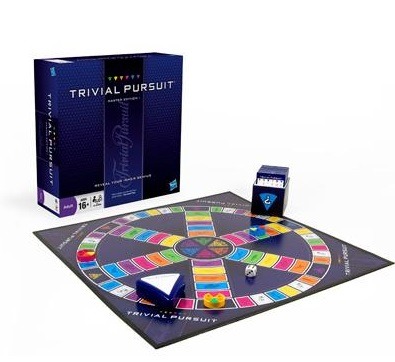
Trivial Pursuit is a classic board game series. It was first released in 1981 and is considered synonymous with the genre.
The game in the link is the re-branded classic edition, but there are editions with easier questions (Family Edition) and harder questions (Master and Genus Edition) available.
Players move on the board by die and there are six categories of questions:
- geography,
- entertainment,
- history,
- arts & literature,
- science & nature and
- sport & leisure.
Instead of racing to the finish line, players compete in collecting pieces of the pie – collect all six pieces (one for each category) and win.
Wit’s End
Players: 2-6
Playing time: 60 minutes
Ages: 12+
Skill factor: Just like Trivial Pursuit, the main skill you need is to be knowledgeable of things. There are no other strategies in the game.
Luck factor: In each ring, there are only several tiles, where you will have the option to advance to the higher ring. So, if you keep missing them, you can’t advance, even if you answer everything right. But usually, it isn’t a game-breaking problem (you can move both left or right), so the luck factor in Wit’s End is still considered low.
Wit’s End uses a cleverly designed board, made of four (+central tile) concentric circles. Players start on the largest circle, on which they move with the help of a die, answering questions on the way.
Answer correctly, and you have another throw of the die. Answer incorrectly, it’s the next player’s turn.
Moving towards that inner circle
Certain tiles on each circle have connections to the next circle. If players answer correctly on such a tile, they advance one circle toward the middle of the board. The first player to reach the central tile and answer correctly is declared the winner.
There are 200 questions of all sorts of themes, but instead of categories, the questions are characterized by type:
- Teaser requires you to solve a riddle.
- In Odd1Out you choose one out of the four answers, that does not relate to others.
- The sequence requires you to arrange answers (usually three) in the required order.
- Wild Card is a surprise category, you never know what type of question you will get.
Besides that, some cards come with a Bonus! or Sorry! feature on the answer part of the card. This is an extra element of luck, giving you chances to promote/demote yourself or your opponent (whatever the cards say).
Overall, Wit’s End is slightly less “smart” oriented than Trivial Pursuit and slightly more “fun” oriented.
2. Guessing Board Games
Trying to guess a hidden word or words is the point of these games. One of the players is trying to “show” the word to other players, by pantomime, drawing, explaining, singing, etc. and other(s) is/are trying to guess it.
Charades
Popular since the 16th century and commonly referred to as The Game, you don’t have to buy anything to play this. One of the players comes up with the word, slogan, title (or whatever house rules you decide to play by), and tells it to the next player who then tries to express the phrase by pantomime (or sound effects). The remaining players then try to guess it. For the next round, the role moves to a new winner.
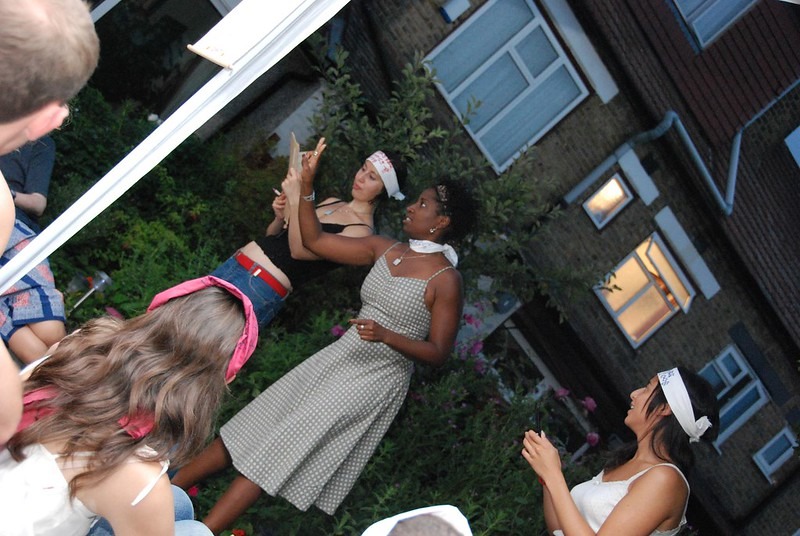
We played this a lot couple of years ago with my friends, down to the point that we got too good at it. I remember one time the guess word was “Four riders of the apocalypse”. To the disbelief of all of us, it only took a couple of minutes to guess.
This is not a competitive game in the way that there will be a winner at the end. But it’s an immensely fun casual game for groups (a few drinks and mixed gender only spices things up). Making a fool out of yourself has never been so much fun.
Taboo
Players: 4-10 (ideally you want an even number of players so that they can be split into pairs)
Playing time: 20 minutes
Ages: 12+
Skill factor: low
Luck factor: low

Another Classic, well over its 30th anniversary.
Players are split into teams of two. Each turn, a team has a limited amount of time available (a timer is included). During that time, they draw cards one by one, until the timer runs out.
On a card, there is a word or a phrase they must describe to their partner, who must guess it. The trick is, that on the cards, there are also five more “taboo” words, which the explaining player is not allowed to use. Of course, these words are usually the ones that describe the first word with the most relevance and ease.
If the word is guessed correctly, the active team receives a point and draws another card. On the other side, inactive teams are policing the action – making sure that no taboo words are used and that the describing player does not make any illegal gestures.
Bzzzz!
If the inactive team catches them “cheating”, they hit the buzzer and the inactive team gets a point. (Arguments can happen at this point – don’t be too competitive and take it as a fun game.)
If the active team has trouble with a certain card, they can pass it and draw another – in this case, the inactive team(s) get a point as well.
The game is played for the pre-agreed number of turns and then the points are added together and the winner is declared.
Activity
Players: 3-16
Playing time: 45 minutes
Ages: 12+
Skill factor: low
Luck factor: low
Players form teams of roughly the same size, for a maximum of four teams. Activity is a racing game – the goal is to be the team that gets to the finish tile first.
Teams’ meeples move on the linear board, consisting of tiles of different types. On each of the tiles, a task must be performed successfully to advance further. There are three types of tasks:
- Charades. One of the team members uses pantomime to describe the term on the card and other team members are trying to guess it.
- Describe. In this type, one of the members is verbally describing the wanted term, and others guess it.
- Draw. The term in question is this time being drawn on a piece of paper, other members of the team are trying to guess it.
A cup of fun for everyone!
There is not much luck or skill involved in conventional ways, but social skills come more into play. Not only it’s important to know how to explain the term in question, but you must also know your team buddies and explain the term in such a way that it will be the easiest for them. But, as is the case with all similar games, the main goal of Activity is to have fun.
After the initial release, several reprints and editions (as well as translations into different languages) have been released and in 2002, Activity 2 was released. it offers refined gameplay and gives players an option to choose the difficulty of the card they draw.
That brings some more tactics into play as you can go for easy cards and move 3 tiles forward or you can risk a bit more and go for hard cards and move 5 tiles forward (or don’t move at all, if you don’t guess correctly). If you want to go through the middle path, there are medium-difficulty cards as well (for 4 tiles).
3. Action and Reaction Board Games
Commonly used game mechanics in this sub-genre consists of two phases:
- In the action phase, a card is drawn, a picture is shown or a quote is read.
- In the reaction phase, players react to first-phase suggestions either by answering or playing cards.
Results can be scored, but normally these games are not focused on the competition side. Their focus is to have fun with hilarious combinations that players put together.
Cards Against Humanity
Players: 4-30
Playing time: 30 minutes
Ages: 17+
Skill factor: There’s not any real skill involved, but if you want to play this competitively, some social skills (knowing other players, and predicting what they will do) are necessary.
Luck factor: There is some luck involved when drawing cards, but it does not play a large role.
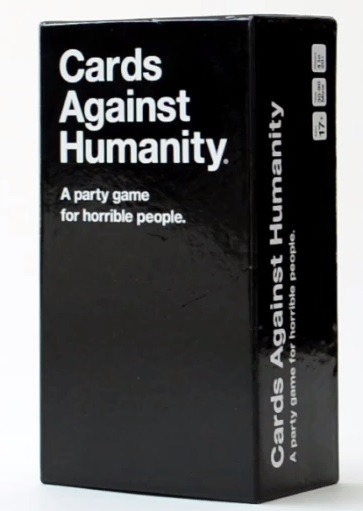
Cards Against Humanity is easily one of the more controversial board games on our list and further.
Each turn, one of the players is designated as a judge – Card Czar. He draws a black card from the deck, which has a question or fill-in-blank, and other players pass one (or two) of their white cards (which contain answers) to him.
Czar then decides on the answer he likes best (is funniest, most cynical, or sarcastic) and that person receives an Awesome Point and becomes the next Czar.
Everyone is Awesome!
Whoever has the most Awesome Points at the end (it’s up to the players to decide, how long they want to play), wins.
What makes the games special, are the topics it covers: taboo subjects like race, gender, religion, torture, poverty, drugs, sex, child abuse, black humor, etc. The more controversial the topic (and your answers), the merrier.
Just play this with good friends as some of the combinations can be offensive and uncomfortable to play with some people. But if you find that offensive = fun and you have the right group of people, Cards Against Humanity is a game for you.
That’s What She Said
Players: 4-10
Playing time: 30-60 minutes
Ages: 16+
Skill factor: Some social skills (knowing other players and predicting what they will do) are necessary for competitive play, but I don’t recommend playing it competitively.
Luck factor: There is luck involved when drawing cards, but it doesn’t really matter what you draw.
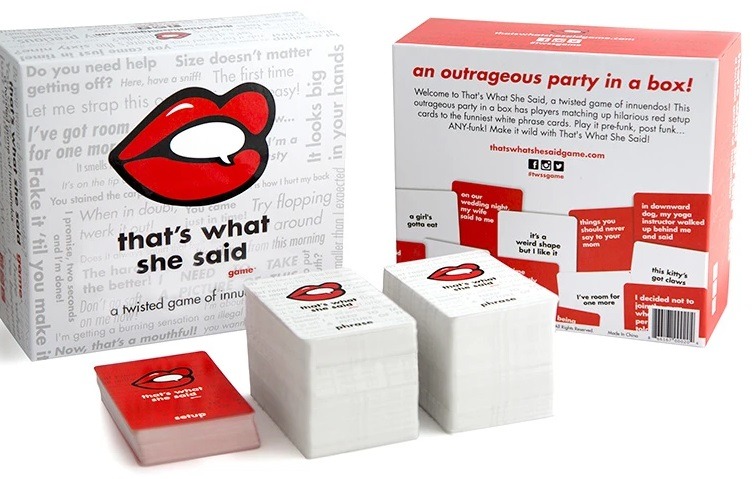
A very similar game concept to Cards Against Humanity, only that this is way kinkier – it focuses mainly on sexual topics.
A turn starts with one of the players being the judge. He draws the red Setup card, to which players add their responses, and the white Phrase cards.
The judge picks the winning combination (the funniest and sexiest phrase to his or her liking), and the player providing the winning Phrase card gets a point. The next player becomes the new judge. The first to four points (unless you decide on different victory conditions) is the winner.
That’s What She Said is a great ice–breaker game for parties of mixed gender. Let’s say a dorm party. It is as kinky and naughty as the cards you choose to play (usually intensifies during the game) and, compared to Cards Against Humanity, a lot less offensive.
Dixit
Players: 3-6
Playing time: 30 minutes
Ages: 8+
Skill factor: As with other action-reaction games, knowing other players, how they think, and how they play, can be very beneficial to winning.
Luck factor: Luck doesn’t play a big role.
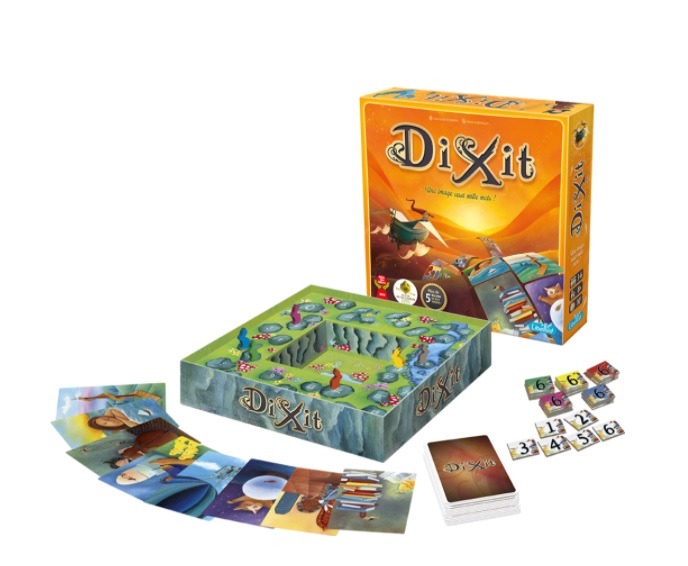
If you like making up, telling, and listening to all kinds of stories, you’ll like Dixit. It’s a board game about storytelling.
Each player is dealt 6 cards. But there are no words on these cards, only colorful pictures of all sorts. That’s very helpful for players whose English is not their strongest point.
The action phase of the turn begins with one player being the storyteller. He selects one of his cards and makes up a sentence about the scene on the card and says it out loud.
The reaction phase is slightly longer. First, other players play their cards, trying to select one, that best matches the sentence of the storyteller.
Next, all the cards are given to the storyteller in secrecy, who then shuffles them together with his card and places them face up.
Betting phase
Players then bet upon which picture was storyteller’s. Whoever guesses correctly, gets 3 points and the storyteller also gets 3 points. As a bonus, you get one point for every vote for your cards.
Check out Mysterium, a crime-solving riddle, that uses similar picture mechanics as Dixit
In a special case, where no one or everyone guesses the card, the storyteller scores no points (as a punishment for giving an irrelevant or too accurate clue) and everyone else gets 2 points.
As a storyteller, you must be careful how to make up sentences – you want to be descriptive enough to get some guesses and leave some space for interpretation – but also not descriptive to the point you give your card away.
Dixit is played until the deck runs out of cards or the first player reaches 30 points.
4. Social Deduction Board Games
In social deduction games, players are given secret roles (often completely or partly unknown to others) and are trying to complete their agenda while guessing who the others are and what they are trying to do. These games are slightly (but only slightly) more complex; they require a bit of deduction, social interaction skills, bluffing, and deception.
The Resistance
Players: 5-10
Playing time: 30 minutes
Ages: 13+
Skill factor: Not a complex game by its mechanics, but it does require a high level of social deduction skills.
Luck factor: low
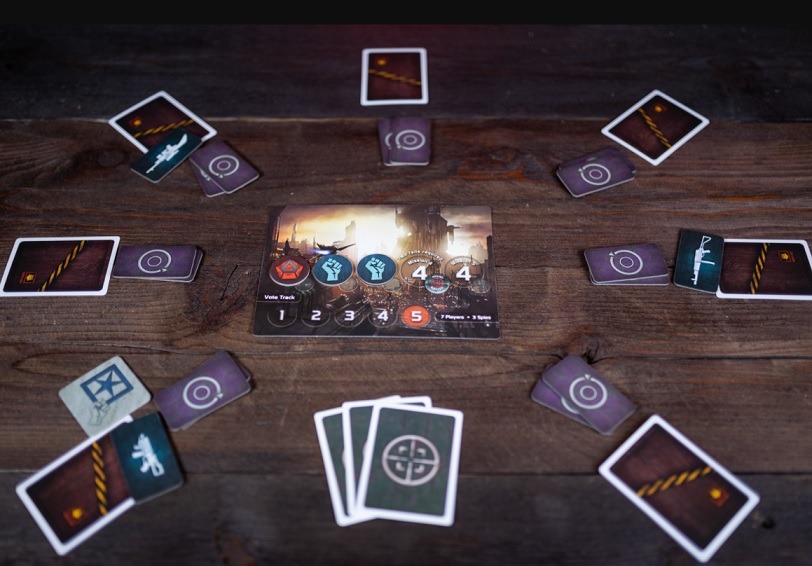
The Resistance is set in a futuristic galactic empire, vaguely inspired by Star Wars: players are split into two teams, named Imperial Spies and Resistance Operatives. There are more Operatives in-game (3 to 2, 4/2, 4/3, 5/3, or 6/3), but the Spies have the advantage of knowing who the other Spies are.
Going out on missions
Although it is in some ways similar to the Mafia/Werewolf games, it does have some unique game mechanics. For starters, there is no player elimination. And gaining intelligence about other players’ roles is done by carrying out sabotage missions against the Empire. Here’s how it works.
Every round starts with a discussion and attempts to guess other players’ identities and gain trust. It is in the rules, that at any time, players are allowed to say anything. So you can expect a lot of interaction: trash-talking, deceiving, and bluffing.
After discussion, the Leader selects players for a mission (passing them cards) and all the players vote to approve the mission. If the mission is rejected, the Leader token passes to the next player. If it’s passed, the Mission phase begins.
In the Mission phase, players on the mission now vote in secrecy: support or sabotage the mission. If the mission is successful, Resistance gets a point, if not, Empire gets a point. The game is played to three points.
The intricacies of Resistance
Where it gets interesting, is what happens between these mechanics: you must deduct from what other players say, act, propose missions and vote on missions, who your friends and enemies are, what should you work towards (maybe failing on purpose to expose a certain spy?), etc.
Also, every mission requires a different number of players to go on. Do you select your fellow spies to go on a mission and guarantee failure, or will that give your roles out too easily? Maybe you want to go on a mission and succeed in it, just to throw other players off your lead? Or will they see through that?
There are endless opportunities on how to approach The Resistance – and no two games will ever be the same. Even if you play against the same people, you will always learn something new and adapt, trying to use new tricks.
One Night Ultimate Werewolf
Players: 3-10
Playing time: 10 minutes
Ages: 8+
Skill factor: Some roles have limited options, while others (like Doppelganger) are more complex. Some social deduction skills are needed for the day phase.
Luck factor: Sometimes you feel your fate is sealed by the role you received and it is not much you can do. But a new game is always only minutes away …
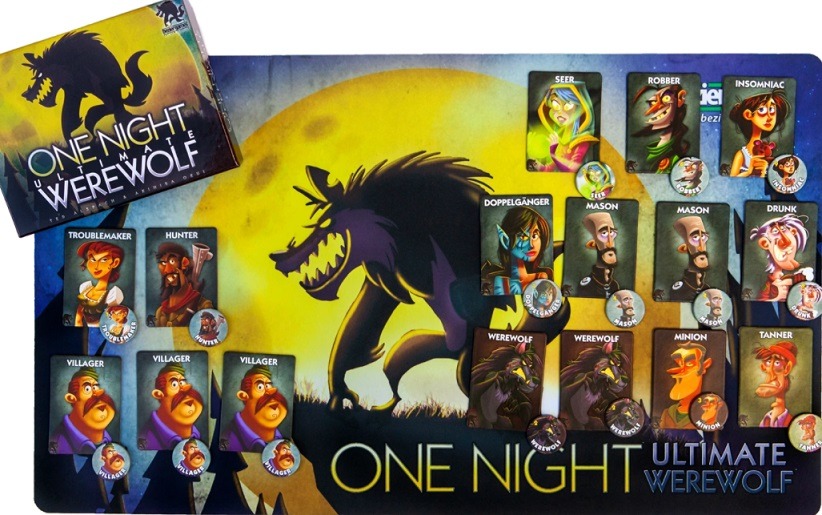
One Night Ultimate Werewolf is, unlike its name, a very short game. It’s all about the roles that players receive with their cards. In a three-player game, you need six role cards, so 3 cards are always left in the center of the table (to avoid predictability). If more players play or you want more complexity, just add more cards.
Setting up One Night Ultimate Werewolf
The roles are two types: the villager’s team and the werewolf team. 16 cards are included: 2 Werewolves, 2 Masons, Seer, Robber, Troublemaker, Drunk, Insomniac, Doppelganger, Tanner, Hunter, Minion, and 3 Villagers.
The game is split into two phases, the night and day phases.
For the night phase, you must first decide on the announcer. This is usually the most experienced player (he can play at the same time) or you can use an app on the phone. The announcer reads out the sequence in which the night phase actions are carried out.
Everyone closes their eyes (no peeking!) and the announcer calls out the roles, that are in play, in a pre-set order. “Werewolves, wake up, and look for other werewolves.” Werewolves are allowed to see who the other werewolves are.
This continues for other roles that have night phase actions. The robber can exchange his card with another player’s, the Troublemaker can switch cards between two other players, Seer can look at another player’s card, etc.
After all the night actions are completed, the day phase commences. Now, players can open their eyes and freely communicate (anything goes). But their role card must not be looked at or shown – they don’t know if their role changed during the night.
Voting
After some discussion (which may end naturally or after a pre-agreed time), it’s time to vote. On a countdown, all players simultaneously point a finger at a player that they want to eliminate.
The player with the most votes is eliminated. If it’s a tie with two or more votes, both players are eliminated. If no one receives more than one vote, everyone survives.
Depending on who survives, the winning team is declared. Werewolves win if no werewolves are killed. And villagers win if they kill at least one werewolf. (There are some fringe scenarios – like a Tanner with his death wish.)
This is the end of the game. Reveal your roles, discuss, have a laugh – and deal the cards for a new round.
One Night Ultimate Werewolf received an expansion/sequel called One Night Ultimate Werewolf: Daybreak. It adds new characters and can also be played on its own.
Secret Hitler
Players: 5-10
Playing time: 45 minutes
Ages: 13+
Skill factor: low-medium. Rules are easy to understand, but you’ve got to know how to “play the people”.
Luck factor: medium. A lot is dependent on how the roles are set up – if the better players get the role of fascists, you’re in trouble.
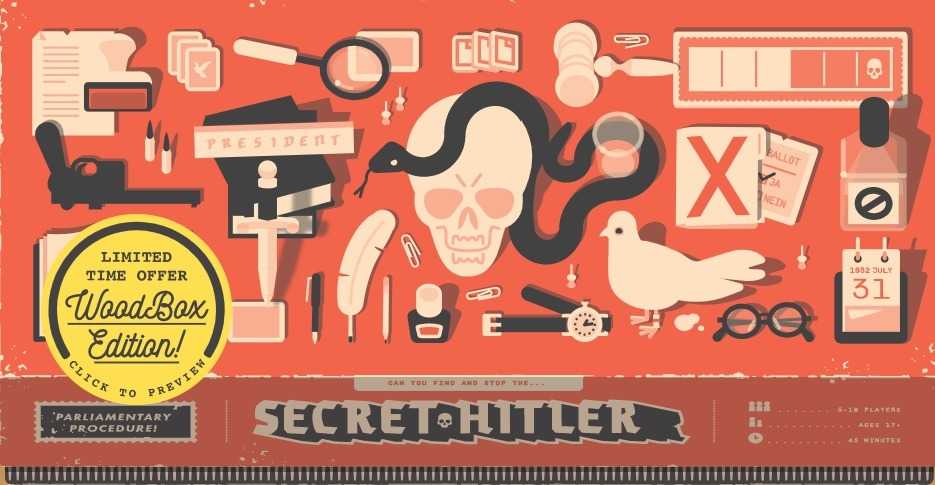
Secret Hitler is a board game, set in 1930s Germany, at the time when the national-socialist party was on the rise. The game tries to replicate this: players are split into two teams: liberals and fascists, with one of the fascists being Hitler himself.
The object of the game for the fascists is to pass six fascist laws or elect Hitler as Chancellor after three fascist laws have passed. Liberals, on the other hand, must pass five liberal laws or assassinate Hitler.
Setting up Secret Hitler
The game is set up in such a way, that liberals always have a majority (3 against 2, 4 against 2, 4 against 3, etc.). One of the fascist players is also given the role of Hitler.
Then players close their eyes and only fascists look at each other: they have the advantage of knowing who their fellow fascists are. For the 7-10 player game, Secret Hitler sticks out his hand, so that the fascists know who he is. For a 5-6 player game, he opens his eyes (but does not stick his thumb out) – he now knows his fellow fascists, but the fascists do not know which one of them Hitler is.
The liberals do not know who anyone else is. Their strength lies in numbers. An app is available as an announcer for the “night” phase so that you can speed this process up.
Course of play
In each round, one of the players is the President. He will choose one of the other players as a Chancellor. This government goes to voting. If it fails, the next player is the President. If it passes, the Legislative session begins.
It’s also possible that Hitler is elected Chancellor. If three fascist laws are already enacted, the fascists win outright.
In the Legislative session, three law cards are drawn and together President and Chancellor will propose one (they are not allowed to communicate – the President removes one card, and passes two to the Chancellor, who then decides), either liberal or fascist law, to go to voting.
Enacted fascist policies enable some special presidential powers and after passing the law, it’s time to use them (after discussion with other players):
- Investigate Loyalty: check whether a player is a member of a fascist or liberal party.
- Call Special Election: instead of a regular turn, you can select who will be the next President.
- Policy Peak: look at the top 3 policy cards in secrecy (and return them on top of the deck).
- Execution: execute a player. If Hitler gets executed, liberals win. If not, that player is eliminated (his role is not revealed) and the game continues.
Of course, as is the case with social deduction games, the real game is happening in the heads of the players, as they try to outsmart others, push their agendas forward and figure out who they can trust.
All that adds up to a very intense experience, full of intrigue, backstabbing, and plotting. If the theme does not bother you, or you even prefer a historic theme over a fictional one, you will enjoy Secret Hitler.
Codenames
Players: 4-8
Playing time: 15 minutes
Ages: 12+
Skill factor: low for team members, medium for Spymaster.
Luck factor: low
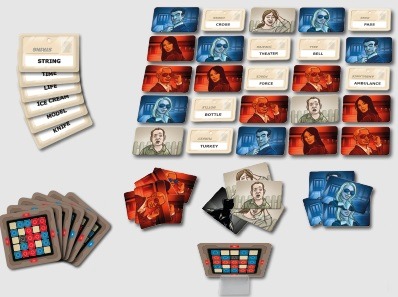
While the previous three games have all similar game mechanics, Codenames is a bit different. You are not trying to reveal other players’ identities. Instead, you are trying to guess the names of other teams’ agents‘ names that are somewhere on the board, consisting of 25 codenames (always random).
Team vs. Team
Players are split into two equal teams and one of the players per team is named the Spymaster. The two spymasters will sit on one end of the table, looking at the Key – a map revealing all the secret identities of the spies on the table. They must keep this key hidden from other players, of course.
On his turn, the spymaster gives one word (+ a number to how many codenames the hint refers to) hints to his team, trying to hint at as many codenames with it. The team can then debate the meaning of the hint. Of, course the rival team should take note of that – those are the agents they must avoid.
After they decide, they must point out at least one codename (and can stop guessing after that at anytime).
- If they hit the right agent, it gets covered with their marker and they get another guess.
- If they hit an innocent bystander, their turn ends.
- If they hit an agent of another team, it gets covered with another team’s marker and their turn ends.
- If they hit the assassin, they lose immediately.
How to win?
When a team covers all of its words, it wins. To keep the game running smoothly, there are a few extra rules:
- If a team is taking too long, the rival thing can flip the sand timer to hurry them up.
- The role of the spymaster is extremely important. During the hint telling and his team guessing, he must keep a completely straight face, giving up no non-verbal hints of any kind.
- His clues must be well-thought-out and for the best gameplay, must follow certain guidelines (as described in the rules). He must understand this thoroughly, as the enjoyment of other players is directly connected to his ability.
If other role-playing games depend on hidden information and social deduction a lot, there is a lot less of that in Codenames. The board is always visible and you focus on the clues given by the Spymasters, not trash-talk from other players. It’s a bit simpler and more straightforward.
Codenames are on the top of every party game list out there. After its success, numerous variants have been released. There is a Pictures version (great for non-English speakers), an adult version as well as Disney, Marvel, and Harry Potter versions.
5. Uncategorized / Special Mention
Exploding Kittens
Players: 2-5
Playing time: 15 minutes
Ages: 7+
Skill factor: low
Luck factor: medium
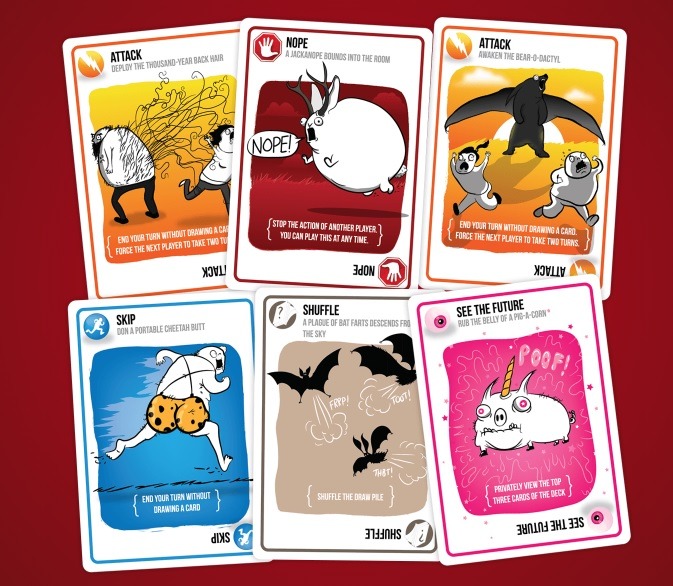
The last game on our list is Exploding Kittens: a very simple game – think of Russian roulette. Players are drawing cards from the deck and the one that draws the exploding kitten gets eliminated.
The trick is, that the deck also contains special action cards, that allow you to
- peek before you draw,
- skip card,
- defuse the exploding kitten card,
- shuffle the deck,
- steal cards from opponents,
- force your opponents to draw more cards.
- You can play a Nope! card to deny your opponent his action.
The game intensifies towards the end when fewer cards are available and the exploding kitten card inevitably comes up. The last player standing is the winner.

Gaming have been a very vital aspect of bringing friends and family together in many situations. Over time we all have this family or group game we love playing together and the gun it brings to us is priceless. In recent time my friends and I have grown to love playing monopoly just to prove who is a better in managing his affairs.
Over 3years and still counting we have had just one champ and it’s time to try something new looking at Trivial Pursuit, its seen quite easy, but from my experience with dice, there are chances of anyone winning. I’ll love to give it a try. Best regards
Trivial Pursuit is not affected by luck much. Sure, you can get lucky and get an easy question (or contrary), but vast majority of the time, the player with the most knowledge will win. That can be unsettling as well. 😀
What an absolutely fantastic post, these are some great ideas for when we have family and friends around, there are some of these games here that I have never even heard of but after reading up on them they do look vary interesting, board games are very good to have in the house, they are there as a sort of back up for when the barbecue is finished and we go indoors when the light starts to fade, I’m tempted to buy a few of your board game recommendations here, I like the loaded questions one and the cards against humanity, in fact I’m finding it difficult to choose because they all look so good and interesting, thank you for sharing this post.
Ther are thousands of other (yes, better than those in this article) board games out there, I just focused on the ones that are easy to pick up and anybody can play.
Be careful with Cards Against Humanity though – their language is … profane, putting it mildly.
Wow, seeing this article the first thing that came to my mind was sharing it to my dad, I won’t say he’s grumpy but he’s shit of fun, all he does with his friends is to watch handball matches. Board games are really good for seniors as it helps catch fun and relax their body nerve through the exercise of playing it, it also work on their mind and thinking. I like the board games in this article, they are full of fun I must say, my favorite is Secret Hitler, its interesting. This post is really entertaining and fun filled, I love it.
Thanks for the comment. I agree that Secret Hitler does not disappoint – everyone will be intrigued by the controversial theme.
Awesome write-up.
I got the trivia pursuit classic for my son not too long. He is really into Trivia and prefers it so much than any other board games. He is eight and I’m mostly able to go through and find questions he can answer, depending on the category. He might be slightly ahead of your average eight year old, but in general a lot of the questions have little hints built into them and if you go through a few, it seems like I find one that is in the realm of what he can reasonably answer. He just asks me whatever question comes up and I’m able to get a fair number of them.
If he starts beating you any time soon, then its time for alarm and going back to books! 🙂
Getting board games for adults that speaks of fun and also combine it with such sleekness as you have presented here is very rare to see in my area and it has been long that I have gotten to play such board games. Wow! I will try to revisit and try to get atleast three from the list you have provided here. thumbs up to you for bringing all these here.
Thank you for your kind words!
Hi Vasilij,
I really enjoyed reading your article on the best party board games for adults. I think its a great idea to try these for a change.
The only ones I have played are trivial pursuit (a brilliant game and also great in the family versions) and exploding kittens which I must admit we didn’t enjoy much.
Are any of the games suitable for older children? We often like to play games as a family especially at Christmas. Thanks in advance, Andrew
Exploding Kittens does have a peculiar taste of humor, so I understand you position. 🙂
Try Forbidden Island – It is a cooperative game (so you can work together as a team) for up to 4 players and it is for ages 10+. I have just recently discovered it and can highly recommend it.
Gaming has been a means to challenging each other in my house and with such contest, my siblings would always go for a trivi a game than any other game. We play monopoly a lot, but since it’s a kind of luck game with dice, it’s been removed. I feel the Trivial Pursuit game would be one we all can agree to. Thanks of sharing .
May I also suggets Settlers of Catan to you?
Right from time, I have always been a big time lover of the trivial games and that is the area I will focus my attention more on here. This is really great to see here and the fact that in this age where digital and video games have taken over, we could still get such awesome games as these. Thanks for sharing all these.
I’m a PC gamer as well, but you are right – playing at the same table against real people has a special charm.
Oh, this is pretty cool. Not the regular chess or snake and ladder. LOL. I think i need to get myself a couple of these not because i would like to play with my family for because my friends say i will be hosting them pretty soon and i was googling the ways t be a good host and the idea of bringing in fun games came up. I will like to try the role-playing games out. Would be very cool. Thanks.
Role playing games are great for parties, especially when people already get slightly “relaxed”. 🙂
The ones on my list are also specifically selected not to have too complicated game mechanics, so even non-gamers can pick them up quickly.
I am a big fan of board games, i really really love them and i am very happy that you could share some of the great ones. I am more interested in roleplaying board games because i have not played them before and i was told about how awesome they are. Even you have mentioned that here. Which do you think is beginner friendly. Do you have a post dedicated to role-playing board games?
All social deduction games (I think that’s what you meant with role playing games) on the list are beginner friendly. I might add Love letters, check that out.
I don’t have a specific post for those games yet, but stay tuned!